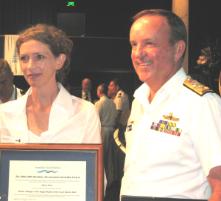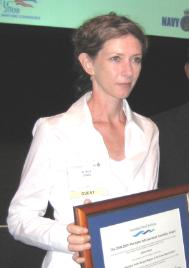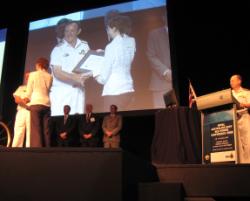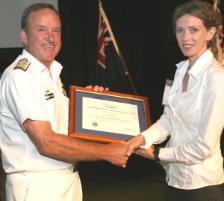'Survivor reefs' subject of new research study
Published on 13 February, 2008
Survivor reefs - pockets of diversity that can survive extreme environmental disturbance and seed coral regeneration on impacted reefs - are the subject of a new research study.
The 2-year study will be carried out by Central Queensland University's Dr Alison Jones, helped by a $44,000 from the Australian Naval Institute's Maritime Advancement Australian Award, presented recently in Sydney.

Dr Alison Jones receives her award
Dr Jones' award project, to be undertaken in the Keppel region of the Great Barrier Reef, will be a pilot study aimed at identifying, mapping and protecting pockets of diversity known as 'marine refugia'.
The award was announced by the Australian Naval Institute (ANI), in conjunction with the Australian National Centre for Ocean Resources and Security (ANCORS) at the University of Wollongong, and is sponsored by Booz Allen Hamilton Australia, EDS and SAAB Systems.
The grant is awarded to the most promising research or development proposal from any of the various fields of maritime endeavour, including science, the environment, maritime law and policy, defence, commerce, shipbuilding and maritime industry.
The award was presented by Vice Admiral Russ Shalders AO, CSC, RAN, Chief of Navy and Patron of the Australian Naval Institute, during the final session of the Sea Power 2008 Conference, held at the Sydney Convention and Exhibition Centre at Darling Harbour on January 31
Dr Jones said that studying the extent and status of marine genetic biodiversity could indicate how ocean ecosystems are coping with variability in the environment.
"Ecosystem condition is an indicator for the pressures on biodiversity, for climate change and for increases in sea surface temperature. If we strategically protect and manage refuges of biodiversity, Australia's national environmental assets are better insured," she said.


"Previous research has focused on identifying the potential for damage to reef systems as a result of climate change processes and the capacity for adaptation.
"This project extends these studies by addressing whether and where there might be ‘refugia' of coral diversity in the Keppels and, as a result, will improve our understanding of their capacity for regenerating nearby reefs after extreme environmental damage.
"It is anticipated that this pilot project could lead to larger scale and scope studies to understand the potential role of marine ‘refugia' in the recovery of reefs in the Keppel Island area. This improved understanding is a necessary step for the identification of possible areas for increased protection aimed at maximising the recovery of marine systems in this area."
Partners in the project include the Great Barrier Reef Marine Park Authority, Queensland Parks and Wildlife Service and the Australian Institute of Marine Science. Close liaison with these partners will ensure that the results of this project are not only of academic interest, but directly relevant to all stakeholders in the Great Barrier Reef.

Photo courtesy Royal Australian Navy
Alison Jones has a background as a secondary school teacher after gaining her first degree in Science at James Cook University in Townsville.
With a deep and abiding love for the Great Barrier Reef, she has also worked extensively as a diving and snorkel guide and in a variety of other jobs associated with local tourism.
Dr Jones has long been active in community work, particularly related to the environment. In recent years, she has been a doctorate of philosophy candidate in applied research at Central Queensland University, where her work has stimulated her scientific interest in environmental issues associated with sustainability and climate change.

